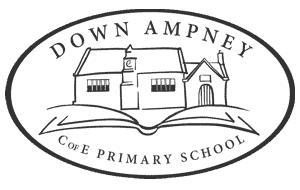
The new approach to teaching mathematics has transformed teaching in this subject.
Ofsted 2018
Maths
Intent
Mathematics at Down Ampney Primary School embraces the aims and content of the National Curriculum and Development Matters, champions a ‘can do’ attitude and embraces the principles of a mastery approach. We aim to develop children’s sense of curiosity about the subject and a determination to master the understanding and knowledge required to realise their full potential, embracing mistakes as part of the learning process.
The Mathematics curriculum is planned following the CanDoMathsscheme of work which is interwoven with the NCETM Ready to Progress objectives to ensure progression. Each year group has a long term plan that shows the smalls steps linked to the National Curriculum and Development Matters objectives. The NCETM Curriculum Prioritisation documents are used to ensure progression within each year and that core content is secure. In EYFS, children are given the opportunity to explore and apply mathematical understanding through continuous provision or through enhanced provision.
Whole-class interactive teaching, using practical resources within all year groups, fosters deep conceptual and procedural knowledge. We use the NCETM ‘5 principles of mastery’ model: coherence, representation and structure, mathematical thinking, fluency and variation in our teaching. All pupils have many opportunities to solve problems by applying their mathematical understanding to a variety of problems with increasing sophistication, including in unfamiliar contexts and to model real-life scenarios. Depth of understanding before speed and learning by mistakes are valued.
After school clubs, in school activities and parent meetings promote a love of Mathematics and raise the profile of Mathematics with children and families.
We use the stem sentence, “If I know, Then I know…” to enable children to make connections with prior learning and explicitly recap previous year’s learning that links to the new concept. At each stage of learning, all pupils develop secure and deep understanding of mathematical concepts with sustainable foundations ready to be built on in the next stage of education.
We use mistakes as an essential part of learning and provide challenge through rich and sophisticated problems before acceleration through new content. Children are scaffolded with Stem sentences to support their new learning and practical resources are always used to expose the mathematics in a new concept.
Small class sizes with additional support staff mean that all children, including those in receipt of Pupil Premium funding receive targeted support using a range of concrete manipulatives and are given opportunities to take part in Mathematics Clubs and Stem challenge days. Staff believe that the vast majority of pupils can achieve at least Age-Related Expectations.
The long-term plan is adapted by teachers and the subject lead based on ongoing assessment of children throughout the year. Units that link to Ready to Progress objectives are prioritised to ensure children are secure before the end of the year. The ‘Mathematics Timetable’ prioritises additional curriculum time beyond the mathematics lesson. Lessons are adapted weekly, based on gaps in understanding and focus groups of children are supported to keep up. SEND children are carefully supported to ensure connections are made with prior understanding.
Implementation
CPD starts with the Subject Lead and learnings are then disseminated to teachers and support staff.
Phase leaders also undertake external CPD.
Class teachers use CPD videos before every Mathematics unit and NCETM CPD videos to ensure subject knowledge as well as pedagogy are strong. Teachers have access to high quality resources to support lesson planning.
Small steps of learning within a unit of work ensure a clear sequence of progression and allow children to be secure before moving onto new content. Declarative, procedural and conditional knowledge are taught explicitly. All pupils have an appreciation of number and number operations, which enables mental calculations and written procedures to be performed efficiently, fluently and accurately to be successful in mathematics. Concrete and pictorial representations are chosen carefully to help build procedural and conceptual knowledge together.
Vocabulary is introduced and displayed and used in stem sentences. Children are encouraged to use stem sentences to explain their answers and how they know. Mathematical ideas are discussed and reasoned and not passively ‘received’ by pupils and tasks are deliberately designed to encourage pupils to describe, explain, justify, convince or prove.
Explaining mistakes is a core part of our Mathematics provision, which enables children to use mathematical vocabulary and reasoning skills to deepen their understanding. Worked examples and sentence stems support them in their reasoning.
Children’s experience of Mathematics in enriched by visits from external visitors such as The Puzzle Company and NatwestMoneysense.
Pupils’ difficulties and misconceptions are identified through immediate same day/week formative and periodic summative assessment. Pupils’ difficulties and misconceptions are addressed with rapid intervention within the lesson and interventions are put in place rapidly.
Impact
We work with local secondaries to ensure Year 6 pupils have the skills needed to access Mathematics at secondary school, such as working with scientific calculators in Year 6.
The impact of our mathematics curriculum is evident in the progress made by our pupils. By the end of their time at Down Ampney, we expect pupils to have a secure understanding of the key mathematical concepts and skills. They will be able to reason mathematically, solve problems effectively, and apply their knowledge confidently in a range of contexts.
Pupils will demonstrate a clear progression in their mathematical abilities, regardless of their starting points. They will exhibit resilience, perseverance, and a growth mindset. We aim for our pupils to achieve above national expectations.
Furthermore, our pupils will have a positive attitude towards mathematics, considering it as an enjoyable subject. They will have developed a sense of curiosity, creativity, and appreciation for the beauty and power of mathematics. This will equip them for success in their further education and future careers, while also contributing to their broader personal development.
Mathematics Core Skills Progression Year R-6
NCETM Progression in mathematical skills and knowledge
Curriculum coverage by year group.

